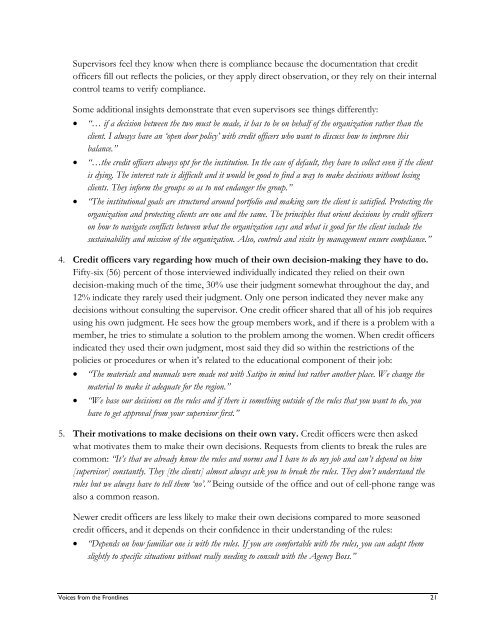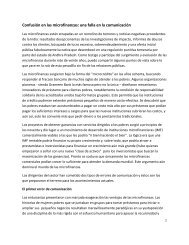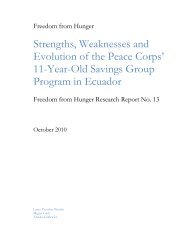Voices from the Frontlines: - Freedom from Hunger
Voices from the Frontlines: - Freedom from Hunger
Voices from the Frontlines: - Freedom from Hunger
You also want an ePaper? Increase the reach of your titles
YUMPU automatically turns print PDFs into web optimized ePapers that Google loves.
Supervisors feel <strong>the</strong>y know when <strong>the</strong>re is compliance because <strong>the</strong> documentation that credit<br />
officers fill out reflects <strong>the</strong> policies, or <strong>the</strong>y apply direct observation, or <strong>the</strong>y rely on <strong>the</strong>ir internal<br />
control teams to verify compliance.<br />
Some additional insights demonstrate that even supervisors see things differently:<br />
“… if a decision between <strong>the</strong> two must be made, it has to be on behalf of <strong>the</strong> organization ra<strong>the</strong>r than <strong>the</strong><br />
client. I always have an ‘open door policy’ with credit officers who want to discuss how to improve this<br />
balance.”<br />
“…<strong>the</strong> credit officers always opt for <strong>the</strong> institution. In <strong>the</strong> case of default, <strong>the</strong>y have to collect even if <strong>the</strong> client<br />
is dying. The interest rate is difficult and it would be good to find a way to make decisions without losing<br />
clients. They inform <strong>the</strong> groups so as to not endanger <strong>the</strong> group.”<br />
“The institutional goals are structured around portfolio and making sure <strong>the</strong> client is satisfied. Protecting <strong>the</strong><br />
organization and protecting clients are one and <strong>the</strong> same. The principles that orient decisions by credit officers<br />
on how to navigate conflicts between what <strong>the</strong> organization says and what is good for <strong>the</strong> client include <strong>the</strong><br />
sustainability and mission of <strong>the</strong> organization. Also, controls and visits by management ensure compliance.”<br />
4. Credit officers vary regarding how much of <strong>the</strong>ir own decision-making <strong>the</strong>y have to do.<br />
Fifty-six (56) percent of those interviewed individually indicated <strong>the</strong>y relied on <strong>the</strong>ir own<br />
decision-making much of <strong>the</strong> time, 30% use <strong>the</strong>ir judgment somewhat throughout <strong>the</strong> day, and<br />
12% indicate <strong>the</strong>y rarely used <strong>the</strong>ir judgment. Only one person indicated <strong>the</strong>y never make any<br />
decisions without consulting <strong>the</strong> supervisor. One credit officer shared that all of his job requires<br />
using his own judgment. He sees how <strong>the</strong> group members work, and if <strong>the</strong>re is a problem with a<br />
member, he tries to stimulate a solution to <strong>the</strong> problem among <strong>the</strong> women. When credit officers<br />
indicated <strong>the</strong>y used <strong>the</strong>ir own judgment, most said <strong>the</strong>y did so within <strong>the</strong> restrictions of <strong>the</strong><br />
policies or procedures or when it’s related to <strong>the</strong> educational component of <strong>the</strong>ir job:<br />
“The materials and manuals were made not with Satipo in mind but ra<strong>the</strong>r ano<strong>the</strong>r place. We change <strong>the</strong><br />
material to make it adequate for <strong>the</strong> region.”<br />
“We base our decisions on <strong>the</strong> rules and if <strong>the</strong>re is something outside of <strong>the</strong> rules that you want to do, you<br />
have to get approval <strong>from</strong> your supervisor first.”<br />
5. Their motivations to make decisions on <strong>the</strong>ir own vary. Credit officers were <strong>the</strong>n asked<br />
what motivates <strong>the</strong>m to make <strong>the</strong>ir own decisions. Requests <strong>from</strong> clients to break <strong>the</strong> rules are<br />
common: “It’s that we already know <strong>the</strong> rules and norms and I have to do my job and can’t depend on him<br />
[supervisor] constantly. They [<strong>the</strong> clients] almost always ask you to break <strong>the</strong> rules. They don’t understand <strong>the</strong><br />
rules but we always have to tell <strong>the</strong>m ‘no’.” Being outside of <strong>the</strong> office and out of cell-phone range was<br />
also a common reason.<br />
Newer credit officers are less likely to make <strong>the</strong>ir own decisions compared to more seasoned<br />
credit officers, and it depends on <strong>the</strong>ir confidence in <strong>the</strong>ir understanding of <strong>the</strong> rules:<br />
“Depends on how familiar one is with <strong>the</strong> rules. If you are comfortable with <strong>the</strong> rules, you can adapt <strong>the</strong>m<br />
slightly to specific situations without really needing to consult with <strong>the</strong> Agency Boss.”<br />
<strong>Voices</strong> <strong>from</strong> <strong>the</strong> <strong>Frontlines</strong> 21















